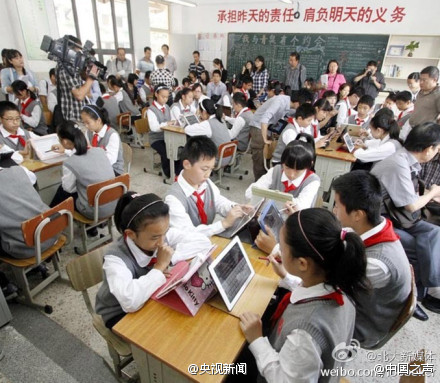|
Tablet technology enters classrooms, accompanied by concerns
At Beijing's Haite Garden Primary School, pupils pore over their work, concentrating on sums and language learning. But they are reading their study materials not in textbooks, but on the screens of tablet computers linked to a wireless broadband network.
Such scenes are currently rare in China, but may become less so after the Beijing municipal government announced on Wednesday that it will earmark three million yuan (about 482,796 U.S.dollars) to promote what is dubbed an "e-bag," turn paper books into e-books and put tablet appliances in the hands of more pupils. Haite Garden Primary School recently became one of a handful of schools in the capital to take this plunge when it decided to restructure teaching practices using the technical breakthrough of hand-held computers. A free tablet was issued to each child in grade one and two at the Shijingshan District school at the start of spring. In an age when toddlers learn to use touchscreens before they can talk, tablet technology is starting to get a toe in the door of traditional classrooms. Li Jiangnan, a teacher with the school, explains that students use the tablets in three classes -- Chinese, math and English. The technology enables vibrant interactions in classrooms. In Li's class, students follow the teacher's guidance on drawing Chinese characters on their touchscreens. If correct, the strokes turn red, while incorrect ones remain their original color, turning the dull writing practice into a vivid online game. Coming in the wake of the technology's surging popularity, the tablet roll-out is a trial designed to discover new ways to inspire children to learn, according to school head Wu Youying. As a trial site, Haite Garden Primary School has encountered various teething troubles with the project -- including difficulties in network instability, shortage of e-textbook resources and limitations with charging the devices. Yang Dejun, deputy director of the Beijing Academy of Educational Science, says educational authorities have been working to develop more e-textbooks, and programs for downloading teaching resources are being set up. However, not everyone is convinced. Netizens have expressed concerns that electric screens may harm children's eyesight. The authorities should study whether using tablets would have this impact, and that it is irresponsible for the government to take action without such due diligence, according to a post by Internet user Wang Jiafu. Parents also fretted that the youngsters, lacking self control, will log onto instant messaging tools or games as soon as their teachers' backs are turned. "Allowing pupils unlimited access to the Internet is likely to distract their attentions as well as deprive them of imagination," said one parent on condition of anonymity. Education expert Liu Yongming, notes Beijing's attempt to incorporate high technology into traditional classes follows current worldwide teaching trends. "We should treat the tablet as a supportive tool because the essence of education lies in learning and thinking through reading and writing, and this should not be shattered and changed," Liu adds.
|
| Copyright © China.org.cn. All Rights Reserved 京ICP证 040089号 京公网安备110108006329号 网络传播视听节目许可证号:0105123 京公网安备110108006329号 京网文[2011]0252-085号 |

 0
0 








Go to Forum >>0 Comment(s)